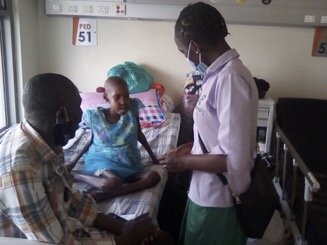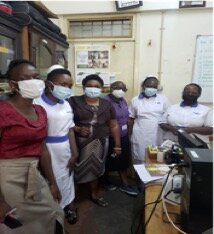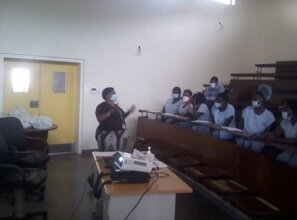By Grace Kivumbi | Project Administrator
Seasons greetings to you all from all of us here in Kampala!
Please accept updates from our work in the last 3 months.
1. Patient care
At the beginning of August 2021, the COVID-19 lockdown was lifted in Uganda and we resumed normal services to our patients and their families, our team members who were sick with COVID-19 had then healed and all were able to get the much needed vaccinations. However, the team has had to take extra caution. Thus, even when public transport was opened, we continue to wear masks, sanitise our hands and social distance and especially now that we have the new variant in the country.
We have been able to review and care for 162 patients and their families with 435 physical contacts and 140 phone contacts. Phone contacts help the team to follow up patients who have been discharged, to provide bereavement support to their families and to offer continuity of care in the community for those who cannot access hospital and this is so helpful to both the patients and the team. The telephoneis equally used to consult with different specialists as part of the multi-disciplinary team, in order to improve the patients’ quality of life.
For our staff who use public transport the costs have gone very high and so we top up with a small amount and this has been very helpful to the team and enabled them to get to work, to be able to provide care to our patients and their families.
Additionally, we are able to access the much-needed PPE -including masks and hand sanitisers and this is not only helpful to the team but also to the patients as sometimes there are patients who come for care without a mask and it helps when we can give them a mask or two.
We remain very grateful for your donations that have enabled us to purchase these items. .
Below we share with you some reflections from our patient care service.
J is a 10-year-old diagnosed with a Rabudoblastoma tumor, she comes from the Eastern part of Uganda and was referred to the palliative care team for pain and symptom management.
She was well until she got abdominal pain and was taken to the clinic with no response. In June this year an ultra sound scan was done and she was told that she had developed a tumor and needed surgery.
It`s now three weeks since she has been under the palliative care programme. The multidisciplinary team of doctors, nurses and volunteers have been able to visit her and her family regularly and became very much interested in her psychosocial needs which were causing a lot of concern and distress to her and the family members, especially not being able to afford food and do other investigations such as the histology which was required by the primary doctors and the failure to have the operation due to la low blood count and being very weak.
The palliative care medical team and volunteers visited her regularly and the volunteers did a wonderful job; counselling, offering practical support, such as picking drugs from the pharmacy and liaising with other team members to help with a small contribution towards food support on a weekly basis.
She said: “I am privileged to have such a loving and caring team that visits us every other day please keep coming even when we are discharged back home! You are a very unique and special group we feel valued and loved” patient J.
Caregiving stress has been associated with changes in the psychological and physical health of parents of children with cancer. With the onset of illness, families go through a number of changes in family routines, structure, and functioning, including redistribution of roles and responsibilities among family members. J’s main caregiver was her dad who was also the bread winner, but now here, he was in the hospital for about 4 months without working or even earning but depending on well-wishers and the extended family.
“I have lost most of my property to try and save my daughter but everyday things are not getting any better. I at times wonder if God hears my prayers and I keep wondering when he will answer them! But with your presence, I am now hopeful that all will be well because I believe your God sent you. In you I see God’s love for my daughter, she can now smile, because her pain is controlled and have a conversation about her wishes and dreams’’. J’s father
2. Education & Training
2.1 Training of undergraduate medical students and postgraduate students
In the last 3 months, we have trained 112 undergraduate medical students from Makerere University, 29 undergraduate medical students from the Islamic University in Uganda. We share with you some of their comments below;
2.2 Training for nurses
We hosted 3 students from the School of Nursing and Midwifery who are attending an Advanced Diploma in Palliative Care Course on a 2-week clinical placement from the 18-29 November.
2.3 Training for allied professionals
We have also trained 16 participants in palliative care from the COME hospital care (15-17Nov 2021)
2.4 Training for the Transform project
3. Online learning and discussions:
In this period, we have attended a number of online discussions that included;
4. Research and research related activities
We have presented at the following conferences;
Thank you so much for taking time to read our updates, we will be sharing regularly and for more information about our work please free to contact us on; info.pcerc@gmail.com
Merry Christmas and a happy and prosperous new year!
God bless you all #stay safe
Project reports on GlobalGiving are posted directly to globalgiving.org by Project Leaders as they are completed, generally every 3-4 months. To protect the integrity of these documents, GlobalGiving does not alter them; therefore you may find some language or formatting issues.
If you donate to this project or have donated to this project, you can receive an email when this project posts a report. You can also subscribe for reports without donating.


